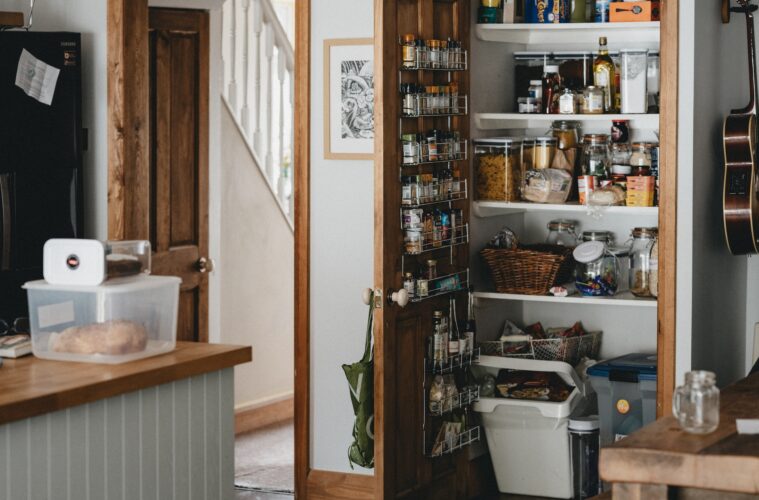Stocking a vegan pantry can be challenging enough, but having an eco-friendly vegan pantry might seem daunting. Appearances can be deceiving though because maintaining a sustainable pantry is quite easy to achieve. Here are several of our best tips for an eco-friendly vegan pantry.
1. Select Reusable Containers
If you are a dedicated recycler, you can recycle any plastic tubs and containers you have from foods already consumed or takeaways. Other options include stainless-steel containers or glass jars. They last much longer than plastic and can be reused countless times. Unlike some plastics, both glass and stainless-steel chemicals won’t seep into your foods. Reusable containers are fundamental to achieving an eco-friendly pantry.
2. Limit the Amount of Packaging and Reuse It When Possible
Our landfills and oceans are filled with plastic packaging. Plastic is created using fossil fuels. While it’s almost impossible to avoid, you can make a concerted effort to limit the amount of packaging when shopping. Consider buying food with resealable packaging. When possible, wash and reuse plastic containers. Select packaging that is biodegradable or recyclable if available.
3. Shop in Bulk Quantities
Purchasing your foods from bulk bins can eliminate a significant amount of packaging. Opt for larger containers of foods instead of smaller individual packets, tubs, cups, or containers. This shopping method will also allow you to buy the specific quantities of foods that you need. Bring your containers with you! You’ll save time and money.
4. Freeze Food That Cannot Be Eaten Before It Spoils
Foods can be preserved for weeks and in some cases months by freezing them. This reduces food waste considerably. Fresh garden foods can be frozen for later use when cooking. Even fresh garden herbs and seasonings can be frozen into ice cubes to be used later in dishes or smoothies.
5. Fill Your Pantry with Dried Goods
Dried goods such as beans, lentils, rice, pasta, nuts, quinoa, chia seeds, and flour are essential foods in the vegan diet, forming the basis of numerous vegan recipes. One great thing about these goods is that they can last for months, especially when stored in glass or stainless-steel containers. They’ll also come in handy if you have to cook and haven’t had much time to do any shopping. Make sure you have nutritious but tasty snacks such as dried fruits, dates, granola blueberry, or raisins.
6. Keep Seasonings and Cooking Essentials on Hand
A challenge for any cook is to not continually repeat the same recipes or get bored with the same dishes. The use of various seasonings is one method to experiment and enjoy new flavours even with your stored dried goods. Turmeric, cumin, ginger, oregano, parsley, mint, basil, rosemary, thyme, and garam masala are all seasonings that you may want to keep available in your pantry. Also, store your seasonings in brown tinted glass to maintain their freshness longer. Don’t forget to store cooking essentials like apple cider vinegar or olive oil in your pantry.
7. Don’t Forget the Beverages and Sweeteners
Fill your pantry with teas and a variety of coffee beans. Store honey and maple syrup in jars or airtight containers.
8. Don’t Throw Vegan Pantry Scraps in the Bin or Down the Drain
Leftover vegan food scraps can be used as animal fodder or to make compost for plants. Vegan foods are generally compostable, so leftover vegetables, legumes, kinds of rice, kinds of pasta, and fruits can be placed in an indoor composter or a composter even if small in dimension to keep on a balcony or porch.
9. Don’t Waste Pantry Water
If you have water left over after boiling or washing vegetables, don’t toss it down the drain. Use it to water plants, vegetables, herb gardens, lawns, or backyards. This water can carry nutrients that your plants will appreciate, and you will avoid wasting a precious resource.
10. Grow Your Vegetables and Herbs
If you live in an apartment, this may seem to be a tall order. But you can grow herbs like basil, mint, or rosemary in cups on windowsills and vegetables like tomatoes in containers especially if you have a balcony or porch. You’ll enjoy the garden-grown taste and can avoid chemical additives and pesticides. You’ll also be happy to have grown indoor herbs to flavour winter soups and stews.
11. Make Eco-Friendly Choices in the Kitchen
Eco-friendly choices are not limited to food and its management alone. Choose alternatives to paper towels and napkins. Opt for biodegradable or eco-friendly garbage bags. Use reusable cloth bags when shopping. In time all these little actions will add up.
12. Use Eco-Friendly Natural Cleaning Products in the Pantry
Mother Earth doesn’t need any more chemicals and toxic substances to keep our living spaces clean. If you need to clean and disinfect your vegan pantry, clean green. When shopping, look for natural cleaning products in recyclable or biodegradable materials. Look for biodegradable cleaning wipes. Another alternative is to make your eco-friendly cleaning products yourself using ingredients like lemon juice, baking soda, vinegar, natural soap, and hydrogen peroxide. The web offers lots of cleaning product recipes.
A Final Thought
If you are a vegan who desires an eco-friendly pantry, these tips will aid you in minimising your kitchen waste output. Buying less and smarter, to begin with, reduces potential waste. Reducing packaging and plastics, reusing containers and materials, shopping wisely, and eliminating waste will all contribute to an exemplary eco-friendly vegan pantry. You won’t simply be engaged in reducing your carbon footprint with a vegan meal choice but will be helping Mother Earth with resource management as well.





